
|
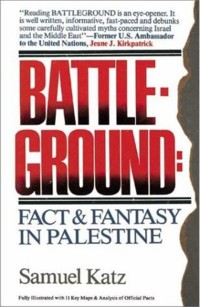 A fully documented, dramatic history of the events which shaped the Middle East. Every key problem in the Arab-Israel conflict, every decision is carefully analyzed, from the questionable policies of Britain in 1948 to how the Palestinian refugee problem began. The territory won in the war of 1967, and the terrorist war of attrition is discussed.
"To most people Battleground surely comes as an eye-opener. I know that even the most knowledgeable people have derived from this book new perceptions--not to mention knowledge--on Jewish history, on the history of Palestine, and on the Arabs."
A fully documented, dramatic history of the events which shaped the Middle East. Every key problem in the Arab-Israel conflict, every decision is carefully analyzed, from the questionable policies of Britain in 1948 to how the Palestinian refugee problem began. The territory won in the war of 1967, and the terrorist war of attrition is discussed.
"To most people Battleground surely comes as an eye-opener. I know that even the most knowledgeable people have derived from this book new perceptions--not to mention knowledge--on Jewish history, on the history of Palestine, and on the Arabs."
--Prime Minister Menachem Begin
- The War Before The Six Day War
- Arab Refugees
- The Origin of the Dispute
- The Jewish Presence in Palestine
- Beginning to Restore the Land
- A Garland of Myths
- The Cause of the Conflict
- Israel's Function in the Modern World
- After the Yom Kippur War
- Guarantees of Peace
The entire book is online on this site - click here to view it.
|
|
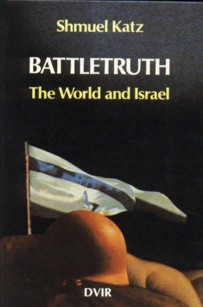 These essays and articles by Shmuel Katz, selected by Yisrael Medad for this volume, were written over the period from February 1978 to the fall of 1982. Most of them appeared in the Jerusalem Post: the remainder, published in Hebrew in Ma'ariv, have been translated by the author. He discusses U.S. policy, Soviet actions and aims, and Israel's foreign and domestic problems. A elegant prose style, with a frequent humorous touch livens up the content.
These essays and articles by Shmuel Katz, selected by Yisrael Medad for this volume, were written over the period from February 1978 to the fall of 1982. Most of them appeared in the Jerusalem Post: the remainder, published in Hebrew in Ma'ariv, have been translated by the author. He discusses U.S. policy, Soviet actions and aims, and Israel's foreign and domestic problems. A elegant prose style, with a frequent humorous touch livens up the content.
The entire book is online on this site - click here to view it.
This book can also be obtained at: Amazon
|
|
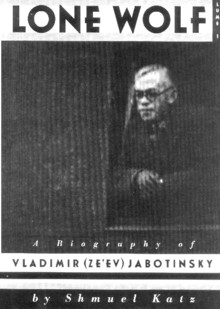 Reading Shmuel Katz's two-volume biography of Vladimir Jabotinsky is a haunting experience. One haunting thing is that Jabotinsky, a figure whose ideas and influence were essential, indeed indispensable, to the founding of the state of Israel, was to die in 1940, at the age of sixty, in a far-off place called Hunter, New York, banished from the land and the community to which he had devoted his life. This banishment, moreover, was not only an official one at the hands of the British authorities then in charge of Palestine who had found him a “nuisance” for his unswervable insistence on the right of Jews to take all they had been given title to under the League of Nations Mandate. It was, far worse, an unofficial one as well, at the hands of many former colleagues who were relieved to have him out of sight and pleased to cooperate in the blackening of his name. The life one follows through this book's nearly 2,000 scholarly and yet totally gripping pages, then, is a life moving ever more inexorably to just one end: conflict, betrayal, exile. - Midge Decter
Reading Shmuel Katz's two-volume biography of Vladimir Jabotinsky is a haunting experience. One haunting thing is that Jabotinsky, a figure whose ideas and influence were essential, indeed indispensable, to the founding of the state of Israel, was to die in 1940, at the age of sixty, in a far-off place called Hunter, New York, banished from the land and the community to which he had devoted his life. This banishment, moreover, was not only an official one at the hands of the British authorities then in charge of Palestine who had found him a “nuisance” for his unswervable insistence on the right of Jews to take all they had been given title to under the League of Nations Mandate. It was, far worse, an unofficial one as well, at the hands of many former colleagues who were relieved to have him out of sight and pleased to cooperate in the blackening of his name. The life one follows through this book's nearly 2,000 scholarly and yet totally gripping pages, then, is a life moving ever more inexorably to just one end: conflict, betrayal, exile. - Midge Decter
|
|
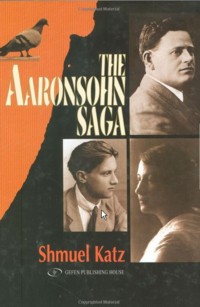 A celebrated botanist, who had won world fame as the discoverer of 'wild wheat,' Aaron Aaronsohn (1876 1919) created the first Jewish Agricultural Experiment Station in Palestine then under Turkish rule in 1910.
In World War I, reacting against the oppressive Turkish regime, Aaronsohn founded a
Jewish spy organization, nili, to help the British in the forthcoming battle for Palestine. Here is told the story of Aaronsohn, who is revealed as a master of strategy, and his sister Sarah, whose self-sacrificing devotion to the cause shows her to be a great historic personality in her own right. Powerfully written, with deep sensitivity to the emotional lives of the people portrayed, The Aaronsohn Saga is both solid history and a marvelous read.
A celebrated botanist, who had won world fame as the discoverer of 'wild wheat,' Aaron Aaronsohn (1876 1919) created the first Jewish Agricultural Experiment Station in Palestine then under Turkish rule in 1910.
In World War I, reacting against the oppressive Turkish regime, Aaronsohn founded a
Jewish spy organization, nili, to help the British in the forthcoming battle for Palestine. Here is told the story of Aaronsohn, who is revealed as a master of strategy, and his sister Sarah, whose self-sacrificing devotion to the cause shows her to be a great historic personality in her own right. Powerfully written, with deep sensitivity to the emotional lives of the people portrayed, The Aaronsohn Saga is both solid history and a marvelous read.
|
|
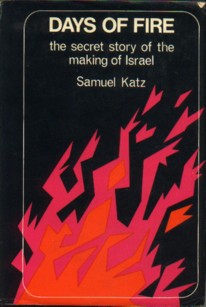 Here is the complete, secret history of the so-called 'terrorist' band of fighting Jews (the "Irgun") who played a
crucial and little understood role in the making of Israel. The book gives a first-hand account of the guerilla war waged
against the British, the Arabs, and in some cases, against fellow Jews.
Here is the complete, secret history of the so-called 'terrorist' band of fighting Jews (the "Irgun") who played a
crucial and little understood role in the making of Israel. The book gives a first-hand account of the guerilla war waged
against the British, the Arabs, and in some cases, against fellow Jews.
This book can be obtained at: Amazon.
|
|
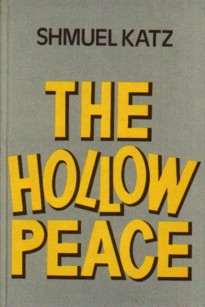 The Hollow Peace
is in a sense a follow-up on the author's Days of Fire which, on a broad canvas, told the story of the Irgun Zvai Leumi and the birth of Israel. The central core of The Hollow Peace is an account of the astonishing history of the "Likud" government elected in 1977 which had pledged itself to cure the malaise, spiritual and material, which had afflicted Israel following the Yom Kippur War. But the story takes the reader back as far as 1948 in illuminating the ideas activating the two major schools of thought in Israel — and the great changes that should have taken place on Begin's rise to power.
It is an account of the abrupt and irrational abandonment of an ideology and a policy, of illusions that were fostered and pledges that were broken.
The Hollow Peace
is in a sense a follow-up on the author's Days of Fire which, on a broad canvas, told the story of the Irgun Zvai Leumi and the birth of Israel. The central core of The Hollow Peace is an account of the astonishing history of the "Likud" government elected in 1977 which had pledged itself to cure the malaise, spiritual and material, which had afflicted Israel following the Yom Kippur War. But the story takes the reader back as far as 1948 in illuminating the ideas activating the two major schools of thought in Israel — and the great changes that should have taken place on Begin's rise to power.
It is an account of the abrupt and irrational abandonment of an ideology and a policy, of illusions that were fostered and pledges that were broken.
This book can be obtained at: Amazon
|
|
|